The Fathers of the Church: St. John Chrysostom (9 vols.)
Digital Logos Edition
Overview
St. John Chrysostom—the “golden-mouthed”—has long been celebrated for his eloquent articulation of the Christian faith and exposition of the Bible. Revered in both East and West, only St. Augustine has more works that survive to the present day from the Early Church Fathers.
This collection gathers together Chrysostom’s works from the celebrated The Fathers of the Church Series. Including works—such as his homilies on Genesis—that have never before been translated into English, this set provides fresh translations of some of Chrysostom’s most stirring homilies. Through these texts, you will receive a glimpse into the way the early Church viewed some of the most pivotal scripture passages and theological issues of the day.
- Includes inspiring exegesis on scripture
- Provides new translations of classic homilies, as well as first-ever English translations of other important works
- Offers insight into early Christian thought and teaching
- Title: Fathers of the Church: St. John Chrysostom
- Author: John Chrysostom
- Series: The Fathers of the Church
- Publisher: Catholic University of America
- Volumes: 9
- Pages: 3,244
- Resource Type: Ancient Texts
- Topic: Church Fathers
Individual Titles
- Commentary on Saint John the Apostle and Evangelist: Homilies 1–47
- Commentary on Saint John the Apostle and Evangelist: Homilies 48–88
- Discourses Against Judaizing Christians
- On the Incomprehensible Nature of God
- Apologist
- Homilies on Genesis, 1–17
- Homilies on Genesis, 18–45
- Homilies on Genesis, 46–67
- On Repentance and Almsgiving
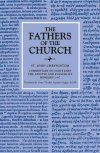
Commentary on Saint John the Apostle and Evangelist: Homilies 1–47
- Author: John Chrysostom
- Translator: Thomas Aquinas Goggin
- Series: Fathers of the Church
- Publisher: Catholic University of America Press
- Publication Date: 1957
- Pages: 505
The homilies on St. John’s Gospel come from the period in which Chrysostom attained his greatest fame as pulpit orator, the years of his simple priesthood at Antioch (386–397). This was the peaceful period in Chrysostom’s life that preceded his elevation to the episcopacy as patriarch of Constantinople (398), wherein adverse imperial and ecclesiastical reaction to his program of moral reform led to his deposition, banishment, and all but martyr’s death (407).
The 88 homilies, which date from about 390, work systematically through the text of St. John’s Gospel and thus form a commentary upon it. In his exposition Chrysostom reflects his youthful Antiochene training in the interpretation of Holy Scripture through his emphasis upon the literal or historical meaning of the sacred text. The exposition focuses sharply on practical morality and thus often supplies telling information about fourth-century life and times. The homilies show the flowering of Chrysostom’s intensive study of rhetoric and are especially commendable for their command of imagery. The first 47 homilies carry Chrysostom’s commentary through chap. 6.54–72; the remaining 41, extending the commentary through to the end of the Gospel, are contained in vol. 41 of this series.
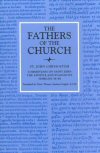
Commentary on Saint John the Apostle and Evangelist: Homilies 48–88
- Author: John Chrysostom
- Translator: Thomas Aquinas Goggin
- Series: Fathers of the Church
- Publisher: Catholic University of America Press
- Publication Date: 1959
- Pages: 507
The homilies on St. John’s Gospel come from the period in which Chrysostom attained his greatest fame as pulpit orator, the years of his simple priesthood at Antioch (386–397). This was the peaceful period in Chrysostom’s life that preceded his elevation to the episcopacy as patriarch of Constantinople (398), wherein adverse imperial and ecclesiastical reaction to his program of moral reform led to his deposition, banishment, and all but martyr’s death (407).
The 88 homilies, which date from about 390, work systematically through the text of St. John’s Gospel and thus form a commentary upon it. In his exposition Chrysostom reflects his youthful Antiochene training in the interpretation of Holy Scripture through his emphasis upon the literal or historical meaning of the sacred text. The exposition focuses sharply on practical morality and thus often supplies telling information about fourth-century life and times. The homilies show the flowering of Chrysostom’s intensive study of rhetoric and are especially commendable for their command of imagery. The first 47 homilies carry Chrysostom’s commentary through chap. 6.54–72; the remaining 41, extending the commentary through to the end of the Gospel, are contained in vol. 41 of this series.
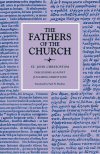
Discourses Against Judaizing Christians
- Author: John Chrysostom
- Translator: Paul W. Harkins
- Series: Fathers of the Church
- Publisher: Catholic University of America Press
- Publication Date: 1979
- Pages: 348
St. John Chrysostom’s Discourses Against Judaizing Christians are eight homilies or sermons with a unifying theme: the correction of certain abuses in a fourth-century Christian community. Judged by modern tastes the Discourses may seem lengthy, and Chrysostom himself admits that they taxed his energies when he complains of having become hoarse. In Antioch of the late fourth century two highly divisive forces contributed to deteriorating Judaeo-Christian relations: very successful Jewish proselytizing, and Christian Judaizing. Both activities profoundly disturbed a vigilant leader and eloquent preacher such as Chrysostom was.
These Discourses, frequently interrupted by applause from the audience, present in their historical context one facet of the deteriorating relations. Antedating Chrysostom by some two centuries, emerging views that the Jews were a people cursed and dispersed in punishment for their unbelief and deicide were gaining credence; witness some statements by Irenaeus in Lyons and Tertullian in northern Africa. In the course of time certain passages of sacred Scripture began to be reinterpreted, when occasion presented itself, in such a way as to endow the polemics with divine authority.
A simplistic view of the complex problem of anti-Semitism raised the cry, almost a century ago, that the Church nurtures hatred against the Jews and at the same time protected them from the fury she had unleashed. However, on October 28, 1965, Vatican Council II issued a decree: Declaration on the Church’s Attitude Toward Non-Christian Religions (cf. Acta apostolicae sedis 58 (1966) 740–744). Therein the Council officially re-affirmed the common religious patrimony of Jews and Christians. It clearly rejected any alleged collective guilt of the Jewish people for the death of Christ and their alleged rejection of God.
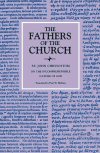
On the Incomprehensible Nature of God
- Author: John Chrysostom
- Translator: Paul W. Harkins
- Series: Fathers of the Church
- Publisher: Catholic University of America Press
- Publication Date: 1984
- Pages: 371
10 of the 12 homilies of St. John Chrysostom presented here were delivered at Antioch over a period of several years beginning in AD 386. The final two homilies were delivered in 398 after Chrysostom became patriarch of Constantinople.
All but one of the homilies aim at refuting the Anomoeans, heretics who revived the most radical tenets of Arius and blatantly claimed that man knows God in the very same way that God knows himself. Chrysostom’s refutations and instructions to the faithful are based on the Scriptures rather than on human reasoning. He departed from this series of refutations only in the sixth homily, which he delivered on December 20, 386, again at Antioch. It consists of a panegyric of St. Philogonius, bishop of Antioch ca. AD 319–323, who before his episcopal ordination had led a very exemplary life, practiced law and contracted a marriage that was blessed with a daughter.
In addition to their theological content, these homilies contain many other points of interest. On one occasion, people applauded the speaker and were very attentive to the homily but then left the church so that when Christ is about to appear in the holy mysteries the church becomes empty (Hom III.32; Hom VII.2). During another homily, pickpockets plied their trade so that Chrysostom urged “let no one come into the church carrying money” (Hom IV.46). Chrysostom also indicates that people kept talking to one another at the sacred moment when Christ becomes present (Hom IV.36). He also mentions that chariot races often proved more enticing than going to church (Hom VII.1). Finally, valuable information on fourth-century Eastern liturgies is found in Hom III.41, 42, and Hom IV.32.
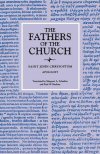
Apologist
- Author: John Chrysostom
- Translator: Margaret A. Schatkin
- Series: Fathers of the Church
- Publisher: Catholic University of America Press
- Publication Date: 1985
- Pages: 310
Apologist is the English translation of two of Chrysostom’s treatises, written about 378 and 382, aimed at provoking the divinity of Jesus Christ.
In Discourse in Blessed Babylas and Against the Greeks, Chrysostom responds to specific attacks on Christianity by such philosophers as Porphyry, using historical narrative and the arguments of fulfilled prophecies to prove Christ’s divinity. Chrysostom relates the story of St. Babylas, bishop and martyr, who defended the Church against an evil emperor and whose relics produced sobriety at Daphne and silenced the oracle of Apollo. Although a product of Christianized sophistic rhetoric, the discourse on Babylas furnishes interesting new material on the development of the veneration of relics and church-state relations in the third and fourth centuries. Schatkin’s translation is based on her critical edition prepared for Sources Chrétiennes.
The Demonstration Against the Pagans that Christ Is God is one of Chrysostom’s earlier works and one of his basic contributions to apologetics. Chrysostom argues for Christ’s divinity in the fulfillment of Old Testament prophecies and in Christ’s own prophecies—particularly those on the phenomenal growth of the Church—to provide proof of a power that can be only divine. Harkins’ translation is based on the unpublished critical edition of Norman G. McKendrick.
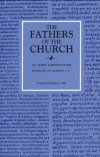
Homilies on Genesis, 1–17
- Author: John Chrysostom
- Translator: Robert C. Hill
- Series: Fathers of the Church
- Publisher: Catholic University of America Press
- Publication Date: 1986
- Pages: 255
This translation makes available for the first time in English one of the most significant Old Testament commentaries of the patristic period. St. John Chrysostom’s extant works outnumber those of any other Father of the East; in the West, only Augustine produced a larger corpus. Of Chrysostom’s more than 600 exegetical homilies, however, only those on the New Testament have previously been translated into English.
The Genesis homilies, his richest Old Testament series, reveal a theologian, pastor, and moralist struggling to explain some of the most challenging biblical material to his congregation in Antioch. He admonishes them to “apply yourself diligently to the reading of Sacred Scripture, not only when you come along here, but at home,” encourages spiritual discourse, and frequently envisages them leaving church reminiscing on the day's sermon. While critical exegetical details go without mention and Chrysostom was limited to the Greek version of the Old Testament in his studies, his oratory has been judged golden and his theology profound. He was a preacher satisfied with commenting on Scripture with his moral purpose always to the fore.
Chrysostom studied the Scriptures with Diodore of Tarsus, a distinguished exegete known from fragments of his commentaries on Genesis and Psalms, and a polemic style developed from his pastoral concern to protect his congregation from the dangerous influences of fourth-century Antioch. Most importantly, he shared the Antiochene school’s insistence on the literal sense of Scripture and their unwillingness to engage in allegorical interpretation. As such, his Genesis homilies constitute a milestone in the history of biblical interpretation.
This first of several volumes on Genesis contains homilies 1–17, delivered in Antioch before Chrysostom moved to Constantinople in 398. Robert C. Hill’s thorough introduction highlights Chrysostom’s significance as a scriptural commentator and provides the basis for an interesting comparison with modern commentators, such as Von Rad and Speiser.
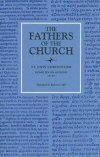
Homilies on Genesis, 18–45
- Author: John Chrysostom
- Translator: Robert C. Hill
- Series: Fathers of the Church
- Publisher: Catholic University of America Press
- Publication Date: 1990
- Pages: 483
John Chrysostom, called the “golden-mouthed” for his eloquent preaching, continues in this second volume of the 67 Genesis homilies to provide instruction for the moral reformation of the Christians of Antioch. He continues in Homily 18 with Genesis 3 and finishes in Homily 45 with Genesis 20. They seem to have been delivered perhaps as early as 385, half just before and during Lent and the remainder, from Homily 33 onward, after Pentecost.
That Chrysostom favored Antiochene exegesis is clear from his exhortation at the beginning of Homily 20 to “take up the thread of the reading and apply. . . the teaching from the passage.” “You see,” he writes, “there is not even a syllable or even one letter contained in Scripture which does not have great treasure concealed in its depth.” He artfully interprets the literal spiritual meaning of this treasure for his congregation through inspiring and colorful exegesis.
It was Chrysostom’s pastoral responsibility to guide his congregation by means of homiletic exegesis. He urged his listeners to take note of the instruction and to give attention to the correction of their own daily lives so as to “proceed to the enjoyment of salvation.” The theme of the good man Noe, who remained unaffected by the universal decline of mankind into wickedness, provides the example for the moral improvement of his listeners in Homilies 23–29, as does the hospitality of Abraham in Homilies 41–45.
The Genesis homilies reveal Chrysostom as commentator, preacher, moralist, and profoundly theological and precise exegete of Scripture, the truth of which he teaches for the betterment of this congregation.
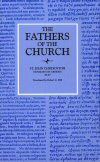
Homilies on Genesis, 46–67
- Author: John Chrysostom
- Translator: Robert C. Hill
- Series: Fathers of the Church
- Publisher: Catholic University of America Press
- Publication Date: 1982
- Pages: 288
St. John Chrysostom delivered his Homilies on Genesis sometime between AD 385 and AD 388, while yet a priest at Antioch. In the homilies in this volume, the last of three, Chrysostom concludes his examination of the lives and virtues of the Old Testament patriarchs Abraham, Isaac, Jacob, and Joseph as recounted in the last three chapters of Genesis.
Known for his eloquent preaching, Chrysostom delivered these final 22 homilies after Pentecost. His motive for examining the accounts of the lives of the patriarchs is to show how the just forebears of the Israelites, in a time when both the law and the Gospel were yet unpreached, were able to live Christian lives with only simple trust in God and the balanced, almost ingenuous manners of antiquity. His interest in the events and characters of Genesis is largely moral, even moralistic; he tends to see Scripture as hagiography. His style of commentary, although not really thorough exegesis, arises out of his deep conviction of the divine inspiration of Scripture—hence the habitual attention to detail, “not idly or to no purpose” being his frequent comment on the precision of the text.
As an exegete, Chrysostom may seem disappointing to those grounded in the methods of modern biblical scholarship, since he largely ignores any sense of Scripture other than the literal and is generally unaware of how to resolve difficulties and appreciate subtleties that a knowledge of the original text would provide. However, what lacks in scientific accuracy he more than compensates for with his earnest practice of pastoral care.
This final volume of the homilies includes a general index and an index of biblical citations, the latter indicating the rich scriptural diet Chrysostom’s congregation—who came daily for his homilies—enjoyed.
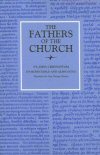
On Repentance and Almsgiving
- Author: John Chrysostom
- Translator: Gus George Christo
- Series: Fathers of the Church
- Publisher: Catholic University of America Press
- Publication Date: 1998
- Pages: 177
St. John Chrysostom delivered nine homilies on repentance in Antioch of Syria sometime between 386 and 387. With conviction and certitude, he preached that repentance was a necessity for both the sinner and the righteous man. This volume presents Chrysostom’s homilies on repentance and includes a sermon on almsgiving that he preached in Antioch during the winter months in 387.
Chrysostom’s work reveals that repentance is an indestructible pillar of the All-Holy, Universal and Immutable Church of Christ. He believed that repentance is the liturgical tool that rejuvenates sinners and admits them into the life-giving Eucharist where they experience fully and dynamically the concrete presence of God.
The powers of repentance have rich biblical roots, and Chrysostom masterfully weaves his teaching with a plethora of Old and New Testament citings. From Scripture, the reader learns that repentance is never confined to the eucharistic context—it becomes a way of life for the believer. The daily applications of repentance, such as almsgiving, fasting, remorse over personal sins, humility, prayer, and attending Church, suggest that a person’s entire life has an ecclesial character. Chrysostom preached that the whole experience of a true life in Christ is repentance that culminates in metanoia—the total change and renewal from the heart and mind of sin to “the mind of Christ” (1 Cor. 2:16).
In his introduction to the homilies, Fr. Gus Christo includes a succinct biography of Chrysostom within which he sets the homilies in their chronological context. He also provides an overview of repentance and discusses the ecclesiological nature of Chrysostom’s theology.
John Chrysostom, Archbishop of Constantinople, was an important Early Church Father. He is known for his eloquence in preaching and public speaking, his denunciation of abuse of authority by both ecclesiastical and political leaders, the Divine Liturgy of St. John Chrysostom, and his ascetic sensibilities. After his death (or, according to some sources, during his life) he was given the Greek surname chrysostomos, meaning “golden mouthed,” rendered in English as Chrysostom.